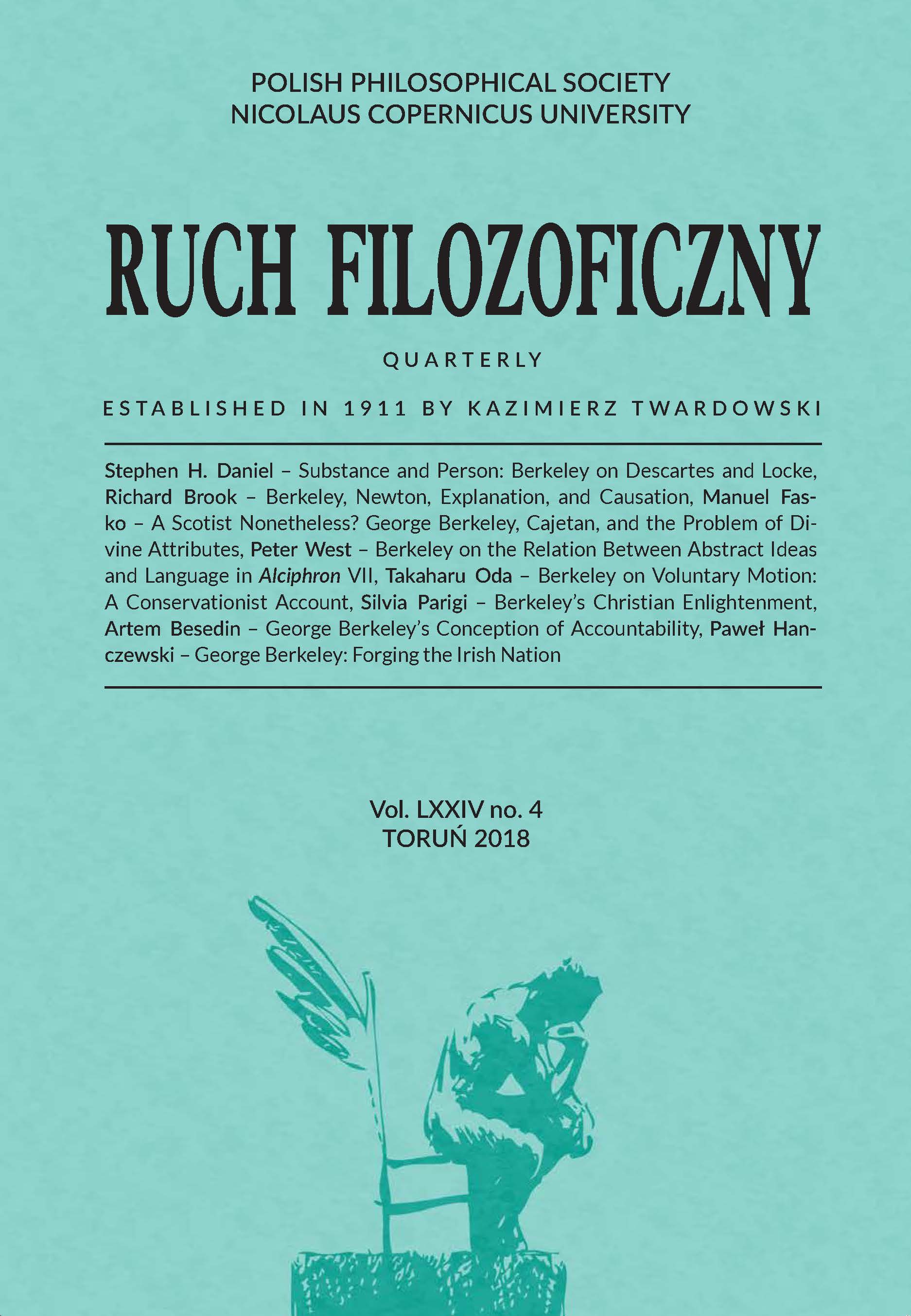George Berkeley’s Conception of Accountability
DOI:
https://doi.org/10.12775/RF.2018.041Słowa kluczowe
George Berkeley, moralna odpowiedzialność, filozofia moralna, utylitaryzm, basic desertAbstrakt
Pojęcie odpowiedzialności u George’a Berkeleya
Analizy przeprowadzone w niniejszym artykule dotyczą zawartych w siódmym dialogu Alkifrona poglądów Berkeleya na odpowiedzialność. Wskazano w nim, że Berkeleyowskie pojęcie odpowiedzialności stanowi odpowiedź na argumentację Samuela Clarke’a i Anthony’ego Collinsa. Zdaniem autora artykułu pojęcie to należy wpisać w monistyczną koncepcję, którą Derk Pereboom określił mianem koncepcji podstawowego zasługiwania (basic desert). Pojęcie odpowiedzialności opiera się na zbiorze zwykłych pojęć: winy i zasługi, pochwały i nagany. Oparty na Trzech dialogach opis „wewnętrznego odchylenia” moralnej odpowiedzialności zostaje tu rozwinięty i odniesiony do Alkifrona. Ogólnie rzecz biorąc, wedle tego opisu obecność pewnego przymiotu woli sprawia, że można komuś w uzasadniony sposób przypisać moralną odpowiedzialność. W dalszej części artykułu objaśniony zostaje sposób, w jaki Berkeley ujmuje ograniczenia i epistemiczne warunki odpowiedzialności moralnej.
Bibliografia
Collins, Anthony. A Philosophical Inquiry concerning Human Liberty, edited by. J. O’Higgins. The Hague: Martinus Nijhoff, 1976.
Berkeley, George. The Works of George Berkeley, Bishop of Cloyne, edited by. A.A. Luce and T.E. Jessop, 9 vols. Edinburgh and London: Thomas Nelson and Sons, 1948–1957.
Berman, David. “Introduction.” In George Berkeley, Alciphron or the minute philosopher in focus, edited by David Berman, 1–16. London: Routledge, 1993.
Berman, David. George Berkeley. Idealism and the Man. Oxford: Clarendon Press, 1994.
Brykman, Geneviève. “On Human Liberty in Berkeley’s Alciphron VII.” In New Interpretations of Berkeley’s Thought, edited by Stephen H. Daniel, 231–246. Amherst, N.Y.: Humanity Books, 2008.
Charles, Sébastian, ed. Berkeley Revisited: Moral, Social and Political Philosophy. Oxford: Voltaire Foundation, 2015.
Fischer, John M. and Ravizza, Mark. Responsibility and Control: A Theory of Moral Responsibility. Cambridge: Cambridge University Press, 1998.
Frankel, Melissa. “Actions, Behaviours and Volitions in Berkeley’s Moral Philosophy.” In Berkeley Revisited: Moral, Social and Political Philosophy, edited by Sébastian Charles, 99–113. Oxford: Voltaire Foundation, 2015.
Harris, James A. Of Liberty and Necessity. The Free Will Debate in Eighteenth-Century British Philosophy. Oxford: Clarendon Press, 2005.
Hight, Marc. “Berkeley on the Difference between Brutes and Men.” In Berkeley’s Lasting Legacy: 300 Years Later, edited by Timo Airsksinen and Bertil Belfrage, 207–222. Newcastle upon Tyne: Cambridge Scholars Publishing, 2011.
Hunter, Hugh. “Berkeley on Doing Good and Meaning Well.” In Berkeley Revisited: Moral, Social and Political Philosophy, edited by Sébastian Charles, 131–146. Oxford: Voltaire Foundation, 2015.
Leibniz, Gottfried W. Theodicy. Charleston, SC: BiblioBazaar, 2007.
Olscamp, Paul. The Moral Philosophy of George Berkeley. The Hague: Martinus Nijhoff, 1970.
Pereboom, Derk. “Optimistic Skepticism about Free Will.” In The Philosophy of Free Will: Essential Readings from the Contemporary Debates, edited by Paul Russell and Oisín Deery, 421–449. Oxford: Oxford University Press, 2013.
Rickless, Sam. “The Nature, Grounds, and Limits of Berkeley’s Argument for Passive Obedience,” Berkeley Studies 26 (2015–16): 3–19.
Schechtman, Maria. Staying Alive: Personal Identity, Practical Concerns, and the Unity of Life. New York: Oxford University Press, 2014.
Shoemaker, David. Responsibility from the Margins. New York: Oxford University Press, 2015.
Sinnott-Armstrong, Walter, "Consequentialism". In The Stanford Encyclopedia of Philosophy (Winter 2015 Edition), edited by Edward N. Zalta. URL = <https://plato.stanford.edu/archives/win2015/entries/consequentialism/>.
Timo Airaksinen, “Vulgar Thoughts: Berkeley on Responsibility and Freedom.” In Berkeley Revisited: Moral, Social and Political Philosophy, edited by Sébastian Charles, 115–130. Oxford: Voltaire Foundation, 2015.
Uzgalis, William, “Anthony Collins”. In The Stanford Encyclopedia of Philosophy (Winter 2014 Edition), edited by Edward N. Zalta. URL = <https://plato.stanford.edu/archives/win2014/entries/collins/>.
Uzgalis, William, ed. The Correspondence of Samuel Clarke and Anthony Collins, 1707-08. Peterborough: Broadview Press, 2011.
Pobrania
Opublikowane
Jak cytować
Numer
Dział
Statystyki
Liczba wyświetleń i pobrań: 689
Liczba cytowań: 0



